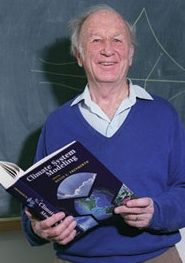dx/dt = P(y – x)

dx/dt = P(y – x)
~ Edward Lorenz
Edward Lorenz (1917 – 2008) was a mathematician and meteorologist. He is remembered as a pioneer of chaos theory. One of the strange attractions of chaos theory is that it deals with things that are entirely deterministic and yet unpredictable. This is an important point because we tend to believe that what is caused deterministically is also predictable. In the world of chaos, you write relatively simple formulas that have recursive elements, and then let them run. What you find is interesting, even beautiful, patterns. You can enjoy them, but you can’t predict them.
The weather is chaotic in this technical, mathematical sense. Clouds are never quite the same. They move and change, never to be exactly repeated. Yet, they do not seem to be random (and they are not). Another of Lorenz’s favorites is breaking surf. It is always changing, yet it is always similar to itself, but never quite the same, and it is always beautiful. When answering the call of gravity, falling leaves and tumbling rocks cut chaotic paths. We know that they will go down, but the precise path is chaotic. Randomness, Lorenz suggests, is overrated. Much of what we consider random is really chaotic and our calling it random is a shortcut for the admission that we cannot predict the outcome.
Tossing a coin is an example or chaos mistaken for randomness. The coin’s movement through the air is fully determined by the forces acting on it. A tiny change in any of these forces can alter the outcome. Lorenz emphasizes the potentially huge and unpredictable (and yet deterministic) effects of initial settings. The image of a butterfly flapping its wings in Mexico and thereby causing a tornado in Texas has become widely recognized.

After making the case for chaos – and against linear (predictable) determinism and against pure randomness – Lorenz pauses and asks us “to consider the question of the free will of human beings, and perhaps other animate creatures” (Lorenz, 1993, p. 158). If there is free will, he writes, “our behavior is then a form of randomness in the broader sense; more than one thing is possible next” (p. 158). After two pages of contemplation, Lorenz concludes with a flourish:
“We must then wholeheartedly believe in free will. If free will is a reality, we shall have made the correct choice. If it is not, we shall still not have made an incorrect choice, because we shall not have made any choice at all, not having a free will to do so” (p. 160).
This is astonishing. After expanding the realm of chaos to cover most of nature, Lorenz concludes that the will is exempted from the grip of determinism. But what is its freedom? Quasi randomness? Why would chaos, which works so well to characterize business cycles, the jet stream, and the movement of the galaxy capitulate at the doorstep of human consciousness (and that of other animate creatures)? I think it does not, and that indeed Lorenz’s theory is a powerful model of mind. William James, in post-Heraclitean fashion, spoke of the stream of consciousness. The thoughts keep coming – seemingly out of nowhere – meander for a while – and then they are gone. Their movements are determined but not quite predictable (which makes them feel free). Indeed, it seems to me that the ebb and flow of consciousness – and the will that is part of it – is a particularly good case of chaos.
How could Lorenz so underestimate his own theory? Did he get scared of what he had wrought? I think that moral scruples caught up with him. In the realm of human behavior, he rejects determinism, and hence chaos. Here’s what he considers the scary part: “If it has already been determined that someone will commit a murder, then, by the same token, it has already been determined whether or not we shall punish him [sic], and there is nothing that we can do about it” (p. 159).
And your point being . . .?
Lorenz is exactly right. If crime is determined, so is punishment. So what? Must we assume that the criminal was free not to crime, so that we can assume that we are free (not) to punish? Is the reason to insist on the criminal’s free will that if we do not insist, we lose our own claim to free will? Is this not a supremely selfish argument? Again, the freedom of the will is already assumed. No argument is made; only a justification is sought. Logically, this is begging the question; morally, it is dubious.
Lorenz’s beautiful finale (“We must wholeheartedly. . .”) is not a proof either (and presumably not intended to be one). It is, instead, an example of Pascal’s prudential calculus. Much like Pascal did not prove the existence of god (only that it is clever to believe in her), Lorenz does not prove free will. Much as his book (The essence of chaos) is enlightening to read, his tangent on free will is – for lack of a better phrase – chaotic.
Lorenz, E. (1993). The essence of chaos. Seattle, WA: University of Washington Press.


